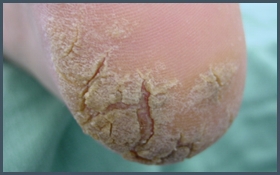 Heel fissures, also known as cracked heels, are a common foot problem. They occur when you don’t treat calluses that form your heels. Over time, the callused skin can become thick, hard, dry and flaky. Eventually, a crack or multiple cracks may develop on your heels. These fissures can form around your entire heel or just on one side of your heel.
Heel fissures, also known as cracked heels, are a common foot problem. They occur when you don’t treat calluses that form your heels. Over time, the callused skin can become thick, hard, dry and flaky. Eventually, a crack or multiple cracks may develop on your heels. These fissures can form around your entire heel or just on one side of your heel.
Cosmetically, heel fissures can be a nuisance. However, sometimes, the cracks can deepen and break open, causing pain and bleeding. In severe case, the fissures can become infected, leading to a serious medical problem.
Causes
Heel fissures can affect anyone. But, they’re more common for people who:
- Live in dry, arid climates with low humidity.
- Walk barefoot frequently.
- Wear sandals or open-backed shoes often since this can cause excessive pressure or friction on the heels.
- Stand for prolonged periods which leads to increased pressure on the feet.
- Have decreased sweat gland activity.
- Experience frequent evaporation of the sweat or oils from the epidermis or outer skin layer.
- Are obese which adds extra pressure on the feet.
- Have a medical condition, such as diabetes, hypothyroidism, Down syndrome, kidney disease or lymphoma since these conditions can make the skin more susceptible to dryness.
Treatment
Like many foot conditions, heel fissures can become dangerous if they’re left untreated, causing them to deepen or become infected. Infections can be especially dangerous for the elderly, people with diabetes, or people with weakened immune systems.
To prevent heel fissures from occurring, use a good medicated moisturizing foot cream or lotion regularly. All natural shea butter is a good moisturizing lotion to use, especially if you have sensitive skin. Moisturize your feet, especially the heels, twice a day. At night, you may want to apply the moisturizer to your feet and wear socks while you sleep to help the lotion absorb into your skin.
Once a heel fissure occurs, it’s best to use a pumice stone daily to gently reduce the thickness of the callused area. Then mositurize your feet at least twice a day. Be sure to sanitize your pumice stone after every use to avoid recontamination of the area, especially if the skin is bleeding or infected. Apply a triple antibiotic ointment to the fissures to help reduce the risk of infection. Avoid going barefoot or wearing open-backed shoes or sandals until the fissures have healed. Shoes with strong shock absorption can help to improve this condition.
However, if the heel fissures deepen, causing severe pain with redness and/or swelling of the area, call your doctor immediately. Note: If you have diabetes and heel fissures develop, call your doctor immediately. Never put creams or lotions between your toes.
Your doctor will need to evaluate your heel fissures and determine the appropriate treatment plan. Treatment may include:
- Surgically removing the dead skin. (You should never use a razor to cut away a callus at home. You may cause serious damage to your skin or an infection may occur.)
- A prescription for a cream with urea concentrate or lactic acid to help wear down the callus.
- The suggestion to wear shoes with strong shock absorption in order to reduce the impact on your heels.
- The use of a plastic heel cup to displace the pressure on the heel.
- The use of a custom foot orthotic, like the ezWalker® Custom Performance Orthotic, to redistribute pressure as you walk and help prevent additional calluses from forming.
Our feet are constantly changing as we age. You should have your shoe fit checked regularly. And remember, the size on the measuring device is only a reference. Mass manufactured shoes are NOT all created equal. Refer to the Shoe Fitting Guide for proper guidelines on how to best fit your shoes.
Note: If you follow these guidelines, but are still suffering from heel fissures, you should consult a physician for a proper diagnosis and treatment.

